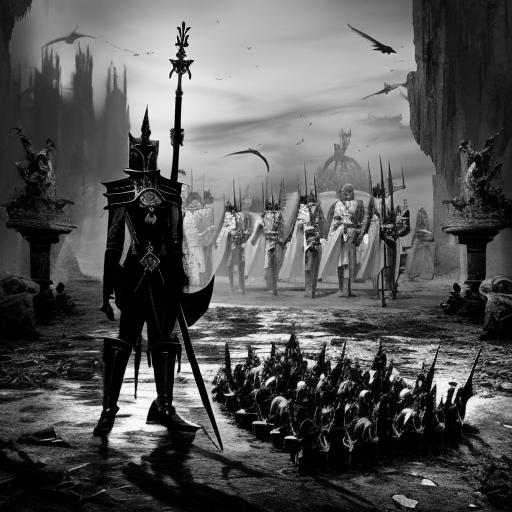One-line Summary:
In “Last Argument of Kings,” the final installment of Joe Abercrombie’s “The First Law” trilogy, war, politics, and magic collide in a gripping tale of power, betrayal, and redemption.
The Struggle for Power
“Last Argument of Kings” continues the epic saga of the North, the Union, and the Gurkish Empire as they vie for control over the land. The novel follows the lives of several key characters, each with their own ambitions and desires. Logen Ninefingers, the legendary warrior, seeks redemption and a way out of the cycle of violence. Jezal dan Luthar, once a self-centered nobleman, finds himself thrust into a position of power and must navigate the treacherous world of politics. And Glokta, the crippled Inquisitor, uses his cunning and ruthlessness to maintain control over the city of Adua.
As war looms on the horizon, alliances are formed and broken, and the characters must confront their own inner demons and make difficult choices. Abercrombie masterfully weaves together their stories, creating a complex and engaging narrative that keeps readers on the edge of their seats.
The Price of Power
Throughout “Last Argument of Kings,” Abercrombie explores the theme of power and its consequences. The characters are driven by their desire for power, whether it be political, military, or magical. However, they soon discover that power comes at a cost. It corrupts, destroys relationships, and leads to a never-ending cycle of violence.
Logen Ninefingers, haunted by his past deeds, grapples with the weight of his reputation as the Bloody-Nine. Jezal dan Luthar, once a naive and idealistic young man, is forced to confront the harsh realities of ruling and the compromises he must make. And Glokta, who wields power through fear and manipulation, is tormented by his own physical and emotional pain.
The Complexity of Morality
Abercrombie’s “Last Argument of Kings” delves into the gray areas of morality, challenging traditional notions of good and evil. The characters are flawed and morally ambiguous, making it difficult to categorize them as heroes or villains. They are driven by their own self-interests, yet they also display moments of compassion and selflessness.
The novel explores the consequences of the characters’ actions and the ethical dilemmas they face. It raises questions about the nature of power, the price of redemption, and the choices individuals make in a world where there are no easy answers.
Key Takeaways:
- The pursuit of power often comes at a great cost, corrupting individuals and perpetuating violence.
- Morality is complex and subjective, with characters displaying shades of gray rather than clear-cut distinctions between good and evil.
- Redemption is possible, but it requires facing the consequences of one’s actions and making difficult choices.
“You have to be realistic about these things.” – Joe Abercrombie, Last Argument of Kings
In “Last Argument of Kings,” Joe Abercrombie delivers a thrilling conclusion to “The First Law” trilogy, exploring themes of power, morality, and redemption. With its complex characters and gripping narrative, the book reminds readers that the pursuit of power often comes at a great cost and that the line between good and evil is not always clear. Abercrombie’s masterful storytelling leaves a lasting impression, urging readers to question the nature of power and the choices they make in their own lives.












